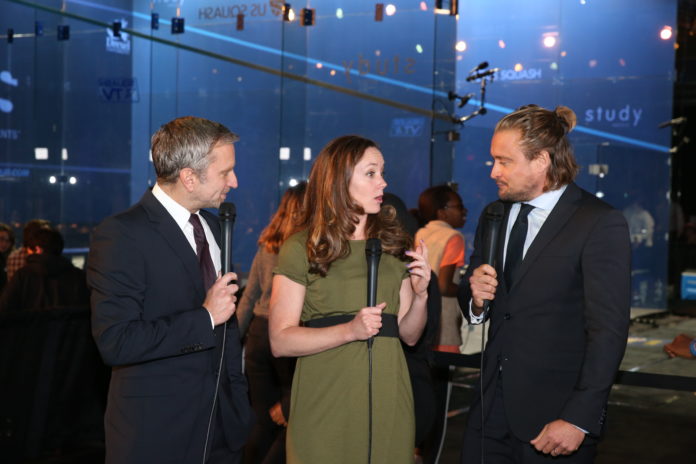Outside The Glass, the world’s oldest squash podcast, is now in its fifth season. OTG is a radio show with a new episode dropping at the beginning of each month. OTG episodes, produced by US Squash, are available podcast apps like Apple Podcasts, Castro, Overcast, Pocket Casts and SoundCloud. In episode forty-six, Aisling Blake, the SquashTV commentator and head coach at Squash Zone in San Francisco, talks about her playing career.
Outside The Glass: You lost in the finals of the Irish Nationals ten years in a row before winning it for the first time in 2013?
Aisling Blake: I ran into Madeline Perry for nine of them. She was brilliant. She was three years ahead of me—that hasn’t changed, which is great. She had done what I did. She did geography at Queen’s University Belfast, and then she went out on tour. She just excelled. She went from strength to strength. For me having that person always up there was great. We’d be on teams, and she’d be number one on the team and she’d be so solid at number one. It was brilliant.
On the flip side, I’d have to go back to Dublin every Christmas for the Nationals. It is a lovely time. It’s the only time my parents get to see me play in the finals against Madeline. They’re sitting there in the stands: “Yeah, no, she’s lost this one. That’s number twelve.”
Then one year Madeline got injured, with a devastating accident actually. She didn’t play. Tt was myself and Laura Mylotte, the number three. We played in the final. I was thinking, “This is it. It’s in the bag.” The pressure of the situation. Laura won it that year. I didn’t even win when I should have on paper—my little chance.
That is why I like working with kids, the coaching element. For me, the mental side of that was massive. It was nothing about squash in that match. I couldn’t deal with the fact that there was a possibility that I might actually reach a goal. Sometimes you self-sabotage, sometimes you don’t. It is much better when you are the underdog, that’s for sure.
The weekend before I went home for the nationals the year when I won it, I went to a party in Amsterdam. I used to be extremely diligent about training, not going out. A couple of friends were visiting, and we went out and I just relaxed and took it easy. Two days later I went to Bristol to train with Hadrian Stiff. I was thinking: “you absolute fruitcake. You’ve messed it up. You’ve been doing so well, and now you’ve gone off and partied and you’ve ruined everything.”
I went to Hadrian, and the first two days were spent with me wanting to fling my racquet at the wall. I was trying not to. Then I toodled over to Dublin and played each match at a time. The finals came. Because I had done a lot of work with Liz [Irving] and Hadrian to just chill out on court, it came together on that day.
I played Madeline. I beat her 3-1. I had never beaten her before, for sure. It was at the Fitzwilliam. Big crowd. I just played. That is the secret of squash: just go out and play. Because if you do that, the best will come out of you.
OTG: How do you think about it now, when you are talking to kids?
AB: That is the thing: you have to talk about it. Everyone thinks they are the only person going through it.
Susan Devoy, who was a fantastic player, in her book she talks about having injuries coming up to events: “my leg is about to fall off, I’ll be lucky to show up.” Everyone has their little thing that would give you a little bit of comfort zone if you didn’t perform because you’ve done your training. A tiny, little bit of an excuse. To alleviate the pressure. Everyone does it.
In order to help the students that I now work with, it is the talking about it, being open about what is their thing. It doesn’t matter that you self-sabotage. It just matters how you deal with it. Can you recognize it?
My biggest struggle with squash was that academically I knew that if I studied I got grades: X=Y=Z. With squash, you study, you do the solo, you do the drills, you do the match play, you have a coach, you have a fitness trainer. You do all these things. You go into the match and sometimes it doesn’t work. It is not fair. It’s just not fair. The best people I see out here are the ones who can play through difficult times. The acceptance: I might do everything, I might tick every box and it might not work on the day. It’s a big thing for juniors, especially for the ones invested in it.


